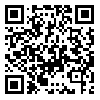Volume 4, Issue 3 (12-2017)
Human Information Interaction 2017, 4(3): 48-59 |
Back to browse issues page
Download citation:
BibTeX | RIS | EndNote | Medlars | ProCite | Reference Manager | RefWorks
Send citation to:



BibTeX | RIS | EndNote | Medlars | ProCite | Reference Manager | RefWorks
Send citation to:
Nowkarizi M, Zeinali M. The overlap and coverage of 4 local search engines: Parsijoo, Yooz, Parseek and Rismoun. Human Information Interaction 2017; 4 (3)
URL: http://hii.khu.ac.ir/article-1-2687-en.html
URL: http://hii.khu.ac.ir/article-1-2687-en.html
Ferdowsi University of Mashhad
Abstract: (15536 Views)
Background and Aim: The aim of this study was to measure the overlap of 4 local Persian search engines of Parsijoo, Yooz, Parseek, and Rismoun and to compare the capabilities of these engines in covering indexable web.
Methods: This was an applied and evaluative research. To collect data, a keyword-based method was used. First, the selected keywords were entered into the search engines and then a sample was extracted of the retrieved records. Finally, based on the existence or absence of these records in the search engines, the necessary data were gathered. Accordingly to analyze the data, inferential statistical methods were used.
Results: The relative overlap of the Parseek compared to that of Parsijoo and Parsijoo's one compared to Yooz was 26 percent on average and Parseek had the most recall. Rismoun had not any common records with the other investigated search engines. Three search engines (Parseekc, Parsijoo and Yooz retrieved 27 common records out of 225 recalled records; there was a significant difference between the relative overlap of the 4 search engines. Also, on average, Parseel, Parsigoo, Yooz and Rismoun covered respectively 38, 31, 26, and 6 percent of the indexable web. There was a significant difference between the coverage of the 4 search engines.
Conclusion: It seems that each search engine has a different indexing policy, and users need to search for more than one search engine to get comprehensive information about an issue. It can be predicted that by foraging in two search engines, Parseek and Parsijoo, one may access 70 percent of the indexable web.
Methods: This was an applied and evaluative research. To collect data, a keyword-based method was used. First, the selected keywords were entered into the search engines and then a sample was extracted of the retrieved records. Finally, based on the existence or absence of these records in the search engines, the necessary data were gathered. Accordingly to analyze the data, inferential statistical methods were used.
Results: The relative overlap of the Parseek compared to that of Parsijoo and Parsijoo's one compared to Yooz was 26 percent on average and Parseek had the most recall. Rismoun had not any common records with the other investigated search engines. Three search engines (Parseekc, Parsijoo and Yooz retrieved 27 common records out of 225 recalled records; there was a significant difference between the relative overlap of the 4 search engines. Also, on average, Parseel, Parsigoo, Yooz and Rismoun covered respectively 38, 31, 26, and 6 percent of the indexable web. There was a significant difference between the coverage of the 4 search engines.
Conclusion: It seems that each search engine has a different indexing policy, and users need to search for more than one search engine to get comprehensive information about an issue. It can be predicted that by foraging in two search engines, Parseek and Parsijoo, one may access 70 percent of the indexable web.
Keywords: information retrieval evaluation, Persian Web, search engine, coverage, overlap, Parseek, Parsijoo, Yooz, Rismoun
Send email to the article author
| Rights and permissions | |
 | This work is licensed under a Creative Commons Attribution-NonCommercial 4.0 International License. |






